Book
ISBN: 1108883389 1108891608 1108890458 1108835104 Year: 2021 Publisher: Cambridge, England : Cambridge University Press,
Abstract | Keywords | Export | Availability | Bookmark
 Loading...
Loading...Choose an application
- Reference Manager
- EndNote
- RefWorks (Direct export to RefWorks)
Thoreau's Religion presents a ground-breaking interpretation of Henry David Thoreau's most famous book, Walden. Rather than treating Walden Woods as a lonely wilderness, Balthrop-Lewis demonstrates that Thoreau's ascetic life was a form of religious practice dedicated to cultivating a just, multispecies community. The book makes an important contribution to scholarship in religious studies, political theory, English, environmental studies, and critical theory by offering the first sustained reading of Thoreau's religiously motivated politics. In Balthrop-Lewis's vision, practices of renunciation like Thoreau's can contribute to the reformation of social and political life. In this, the book transforms Thoreau's image, making him a vital source for a world beset by inequality and climate change. Balthrop-Lewis argues for an environmental politics in which ecological flourishing is impossible without economic and social justice.
Thoreau, Henry David, --- Thoreau, Henry David --- Thoreau, Henry D. --- Toro, Genri Devid, --- Thoreau, Henry, --- Toro, Henri Dejvid, --- Thorō, Enry Deēvint, --- So-lo, --- Toro, Henri Daṿid, --- Thoreau, David Henry, --- Sorō, Henrī Deividdo, --- טהארא, הענרי דייוויד --- טהארא, הענרי דײװיד --- תורו, הנרי דוד --- תורו, הנרי דוד, --- 梭罗, --- ソロー ヘンリー・デイヴィッド, --- Religion.
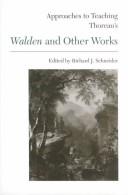
ISBN: 0873527348 087352733X Year: 1996 Publisher: New York, NY : Modern Language Association of America,
Abstract | Keywords | Export | Availability | Bookmark
 Loading...
Loading...Choose an application
- Reference Manager
- EndNote
- RefWorks (Direct export to RefWorks)
Nature in literature --- Solitude in literature --- Nature in poetry --- Thoreau, Henry David, --- Thoreau, Henry D. --- Toro, Genri Devid, --- Thoreau, Henry, --- Toro, Henri Dejvid, --- Thorō, Enry Deēvint, --- So-lo, --- Toro, Henri Daṿid, --- Thoreau, David Henry, --- Sorō, Henrī Deividdo, --- טהארא, הענרי דייוויד --- טהארא, הענרי דײװיד --- תורו, הנרי דוד --- תורו, הנרי דוד, --- 梭罗, --- ソロー ヘンリー・デイヴィッド, --- Study and teaching. --- Walden Woods (Mass.) --- In literature. --- Thoreau, Henry David --- Thoreau (henry david), 1817-1862
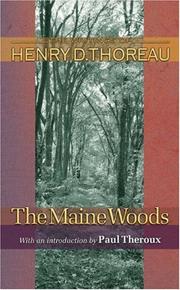
ISBN: 1282639374 9786612639371 1400834139 0691118779 0691014043 9781400834136 9780691118772 9781282639379 6612639377 Year: 2010 Publisher: Princeton, NJ
Abstract | Keywords | Export | Availability | Bookmark
 Loading...
Loading...Choose an application
- Reference Manager
- EndNote
- RefWorks (Direct export to RefWorks)
Henry D. Thoreau traveled to the backwoods of Maine in 1846, 1853, and 1857. Originally published in 1864, and published now with a new introduction by Paul Theroux, this volume is a powerful telling of those journeys through a rugged and largely unspoiled land. It presents Thoreau's fullest account of the wilderness. The Maine Woods is classic Thoreau: a personal story of exterior and interior discoveries in a natural setting--all conveyed in taut, masterly prose. Thoreau's evocative renderings of the life of the primitive forest--its mountains, waterways, fauna, flora, and inhabitants--are timeless and valuable on their own. But his impassioned protest against the despoilment of nature in the name of commerce and sport, which even by the 1850's threatened to deprive Americans of the "tonic of wildness," makes The Maine Woods an especially vital book for our own time.
Authors, American --- Thoreau, Henry David, --- Travel --- Piscataquis County (Me.) --- Maine --- Description and travel. --- Thoreau, Henry D. --- Toro, Genri Devid, --- Thoreau, Henry, --- Toro, Henri Dejvid, --- Thorō, Enry Deēvint, --- So-lo, --- Toro, Henri Daṿid, --- Thoreau, David Henry, --- Sorō, Henrī Deividdo, --- טהארא, הענרי דייוויד --- טהארא, הענרי דײװיד --- תורו, הנרי דוד --- תורו, הנרי דוד, --- 梭罗, --- ソロー ヘンリー・デイヴィッド, --- Piscataquis Co., Me. --- Description and travel --- Thoreau, Henry David
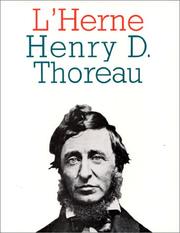
ISBN: 2851970755 9782851970756 Year: 1994 Volume: 65 Publisher: Paris Herne
Abstract | Keywords | Export | Availability | Bookmark
 Loading...
Loading...Choose an application
- Reference Manager
- EndNote
- RefWorks (Direct export to RefWorks)
Thoreau, Henry David --- Thoreau, Henry David, --- Critique et interprètation --- Transcendentalism (New England) --- New England transcendentalism --- -Thoreau, Henry David --- Critique et interprètation --- Criticism and interpretation --- Thoreau, Henry D. --- Toro, Genri Devid, --- Thoreau, Henry, --- Toro, Henri Dejvid, --- Thorō, Enry Deēvint, --- So-lo, --- Toro, Henri Daṿid, --- Thoreau, David Henry, --- Sorō, Henrī Deividdo, --- טהארא, הענרי דייוויד --- טהארא, הענרי דײװיד --- תורו, הנרי דוד --- תורו, הנרי דוד, --- 梭罗, --- ソロー ヘンリー・デイヴィッド, --- Translations into French --- Criticism and interpretation. --- Literature --- -Criticism and interpretation --- Thoreau (henry david), 1817-1862
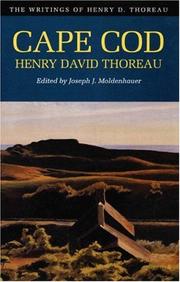
ISBN: 0691065322 0691118426 9786612639364 1282639366 1400834120 069100076X 9781400834129 9780691118420 9781282639362 6612639369 Year: 2010 Publisher: Princeton, NJ
Abstract | Keywords | Export | Availability | Bookmark
 Loading...
Loading...Choose an application
- Reference Manager
- EndNote
- RefWorks (Direct export to RefWorks)
This new paperback edition of Henry D. Thoreau's compelling account of Cape Cod contains the complete, definitive text of the original. Introduced by American poet and literary critic Robert Pinsky--himself a resident of Cape Cod--this volume contains some of Thoreau's most beautiful writings. In the plants, animals, topography, weather, and people of Cape Cod, Thoreau finds "another world" Encounters with the ocean dominate this book, from the fatal shipwreck of the opening chapter to his later reflections on the Pilgrims' landing and reconnaissance. Along the way, Thoreau relates the experiences of fishermen and oystermen, farmers and salvagers, lighthouse-keepers and ship captains, as well as his own intense confrontations with the sea as he travels the land's outermost margins. Chronicles of exploration, settlement, and survival on the Cape lead Thoreau to reconceive the history of New England--and to recognize the parochialism of history itself.
Cape Cod (Mass.) --- Regions & Countries - Americas --- United States Local History --- History & Archaeology --- Thoreau, Henry David, --- Thoreau, Henry D. --- Toro, Genri Devid, --- Thoreau, Henry, --- Toro, Henri Dejvid, --- Thorō, Enry Deēvint, --- So-lo, --- Toro, Henri Daṿid, --- Thoreau, David Henry, --- Sorō, Henrī Deividdo, --- טהארא, הענרי דייוויד --- טהארא, הענרי דײװיד --- תורו, הנרי דוד --- תורו, הנרי דוד, --- 梭罗, --- ソロー ヘンリー・デイヴィッド, --- Travel --- Description and travel. --- Thoreau, Henry David --- Description and travel --- Journeys --- Massachusetts --- BIOGRAPHY & AUTOBIOGRAPHY / Personal Memoirs.
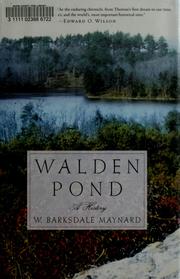
ISBN: 0190290668 1280534273 0198037686 1602568847 9780198037682 9781602568846 9780195168419 0195168410 9781280534270 0195184513 9780195184518 9786610534272 6610534276 0195181379 9780195181371 0197717748 Year: 2004 Publisher: New York Oxford University Press
Abstract | Keywords | Export | Availability | Bookmark
 Loading...
Loading...Choose an application
- Reference Manager
- EndNote
- RefWorks (Direct export to RefWorks)
A chronological narrative of Walden history explains the reasons for Thoreau's decision to build a home in the woods and recounts physical alterations made to Walden in the name of public access and safety.
Authors, American --- American authors --- Homes and haunts --- Thoreau, Henry David, --- Thoreau, Henry David --- Thoreau, Henry D. --- Toro, Genri Devid, --- Thoreau, Henry, --- Toro, Henri Dejvid, --- Thorō, Enry Deēvint, --- So-lo, --- Toro, Henri Daṿid, --- Thoreau, David Henry, --- Sorō, Henrī Deividdo, --- טהארא, הענרי דייוויד --- טהארא, הענרי דײװיד --- תורו, הנרי דוד --- תורו, הנרי דוד, --- 梭罗, --- ソロー ヘンリー・デイヴィッド, --- Walden Pond (Middlesex County, Mass.) --- Middlesex County (Mass.) --- Middlesex Co., Mass. --- History. --- Intellectual life
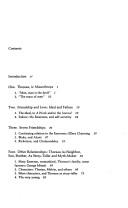
ISBN: 1122051328 0585083940 9780585083940 0870232932 9780870232930 9781122051323 Year: 1980 Publisher: Amherst, Mass.
Abstract | Keywords | Export | Availability | Bookmark
 Loading...
Loading...Choose an application
- Reference Manager
- EndNote
- RefWorks (Direct export to RefWorks)
Humanism in literature. --- Authors, American --- Humanism in literature --- American Literature --- English --- Languages & Literatures --- American authors --- Biography. --- Biography --- Thoreau, Henry David, --- Thoreau, Henry David --- Thoreau, Henry D. --- Toro, Genri Devid, --- Thoreau, Henry, --- Toro, Henri Dejvid, --- Thorō, Enry Deēvint, --- So-lo, --- Toro, Henri Daṿid, --- Thoreau, David Henry, --- Sorō, Henrī Deividdo, --- טהארא, הענרי דייוויד --- טהארא, הענרי דײװיד --- תורו, הנרי דוד --- תורו, הנרי דוד, --- 梭罗, --- ソロー ヘンリー・デイヴィッド, --- Sociology of literature
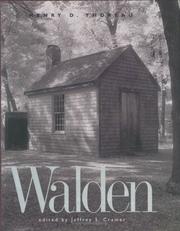
ISBN: 1281729949 9786611729943 0300128045 0300104669 9780300104660 9780300128048 9781281729941 6611729941 Year: 2004 Publisher: New Haven : Yale University Press,
Abstract | Keywords | Export | Availability | Bookmark
 Loading...
Loading...Choose an application
- Reference Manager
- EndNote
- RefWorks (Direct export to RefWorks)
This is the authoritative edition of an American literaru classic: Henry David Thoreau's Walden, an elegantly written record of his experiment in simple living. With this edition, Thoreau scholar Jeffrey S. Cramer has meticulously corrected errors and omissions from previous editions of Walden and here provides illuminating notes on the biographical, historical, and geographical contexts of the great nineteenth-century writer and thinker's life. Cramer's newly edited text is based on the original 1854 edition of Walden, with emendations taken from Thoreau's draft manuscripts, his own markings on the page proofs, and notes in his personal copy of the book. In the editor's notes to the volume, Cramer "es from sources Thoreau actually read, showing how he used, interpreted, and altered these sources. Cramer also glosses Walden with references to Thoreau's essays, journals, and correspondence. With the wealth of material in this edition, readers will find an unprecedented opportunity to immerse themselves in the unique and fascinating world of Thoreau. Anyone who has read and loved Walden will want to own and treasure this gift edition. Those wishing to read Walden for the first time will not find a better guide than Jeffrey S. Cramer.
Wilderness areas --- Natural history --- Authors, American --- Solitude. --- Seclusion --- Loneliness --- Privacy --- Thoreau, Henry David, --- Thoreau, Henry David --- Thoreau, Henry D. --- Toro, Genri Devid, --- Thoreau, Henry, --- Toro, Henri Dejvid, --- Thorō, Enry Deēvint, --- So-lo, --- Toro, Henri Daṿid, --- Thoreau, David Henry, --- Sorō, Henrī Deividdo, --- טהארא, הענרי דייוויד --- טהארא, הענרי דײװיד --- תורו, הנרי דוד --- תורו, הנרי דוד, --- 梭罗, --- ソロー ヘンリー・デイヴィッド, --- Homes and haunts --- Walden Woods (Mass.) --- Social life and customs.
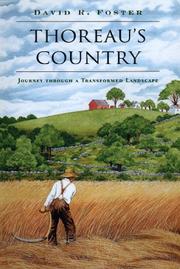
ISBN: 0674037154 9780674037151 0674886453 9780674886452 0674006682 Year: 2009 Publisher: Cambridge, MA
Abstract | Keywords | Export | Availability | Bookmark
 Loading...
Loading...Choose an application
- Reference Manager
- EndNote
- RefWorks (Direct export to RefWorks)
In 1977 David Foster took to the woods of New England to build a cabin with his own hands. Along with a few tools he brought a copy of the journals of Henry David Thoreau. Foster was struck by how different the forested landscape around him was from the one Thoreau described more than a century earlier. The sights and sounds that Thoreau experienced on his daily walks through nineteenth-century Concord were those of rolling farmland, small woodlands, and farmers endlessly working the land. As Foster explored the New England landscape, he discovered ancient ruins of cellar holes, stone walls, and abandoned cartways--all remnants of this earlier land now largely covered by forest. How had Thoreau's open countryside, shaped by ax and plough, divided by fences and laneways, become a forested landscape? Part ecological and historical puzzle, this book brings a vanished countryside to life in all its dimensions, human and natural, offering a rich record of human imprint upon the land. Extensive excerpts from the journals show us, through the vividly recorded details of daily life, a Thoreau intimately acquainted with the ways in which he and his neighbors were changing and remaking the New England landscape. Foster adds the perspective of a modern forest ecologist and landscape historian, using the journals to trace themes of historical and social change. Thoreau's journals evoke not a wilderness retreat but the emotions and natural history that come from an old and humanized landscape. It is with a new understanding of the human role in shaping that landscape, Foster argues, that we can best prepare ourselves to appreciate and conserve it today. From the journal: "I have collected and split up now quite a pile of driftwood--rails and riders and stems and stumps of trees--perhaps half or three quarters of a tree.Each stick I deal with has a history, and I read it as I am handling it, and, last of all, I remember my adventures in getting it, while it is burning in the winter evening. That is the most interesting part of its history. It has made part of a fence or a bridge, perchance, or has been rooted out of a clearing and bears the marks of fire on it.Thus one half of the value of my wood is enjoyed before it is housed, and the other half is equal to the whole value of an equal quantity of the wood which I buy." --October 20, 1855
Authors, American --- Landscape changes --- Natural history --- Change, Landscape --- Geomorphology --- Thoreau, Henry David, --- Foster, David R., --- Thoreau, Henry David --- Thoreau, Henry D. --- Toro, Genri Devid, --- Thoreau, Henry, --- Toro, Henri Dejvid, --- Thorō, Enry Deēvint, --- So-lo, --- Toro, Henri Daṿid, --- Thoreau, David Henry, --- Sorō, Henrī Deividdo, --- טהארא, הענרי דייוויד --- טהארא, הענרי דײװיד --- תורו, הנרי דוד --- תורו, הנרי דוד, --- 梭罗, --- ソロー ヘンリー・デイヴィッド, --- Homes and haunts --- Travel --- New England --- Intellectual life --- Description and travel. --- Description and travel
Book
ISBN: 0813038278 0813043506 9780813043500 9780813038278 9780813034935 0813034930 0813041473 9780813041476 Year: 2010 Publisher: Gainesville, FL : University Press of Florida,
Abstract | Keywords | Export | Availability | Bookmark
 Loading...
Loading...Choose an application
- Reference Manager
- EndNote
- RefWorks (Direct export to RefWorks)
Henry David Thoreau, one of America's most prominent environmental writers, supported himself as a land surveyor for much of his life, parceling land that would be sold off to loggers. In the only study of its kind, Patrick Chura analyzes this seeming contradiction to show how the best surveyor in Concord combined civil engineering with civil disobedience. Placing Thoreau's surveying in historical context, Thoreau the Land Surveyor explains the cultural and ideological implications of surveying work in the mid-nineteenth century. Chura explains the ways that Thoreau's environme
Surveying --- Surveyors --- Authors, American --- Cities and towns --- City surveying --- Land surveying --- Engineering --- Geodesy --- Geomatics --- History --- Thoreau, Henry David, --- Thoreau, Henry David --- Thoreau, Henry D. --- Toro, Genri Devid, --- Thoreau, Henry, --- Toro, Henri Dejvid, --- Thorō, Enry Deēvint, --- So-lo, --- Toro, Henri Daṿid, --- Thoreau, David Henry, --- Sorō, Henrī Deividdo, --- טהארא, הענרי דייוויד --- טהארא, הענרי דײװיד --- תורו, הנרי דוד --- תורו, הנרי דוד, --- 梭罗, --- ソロー ヘンリー・デイヴィッド, --- Knowledge --- Surveying. --- Cartography

 Search
Search Feedback
Feedback About UniCat
About UniCat  Help
Help News
News